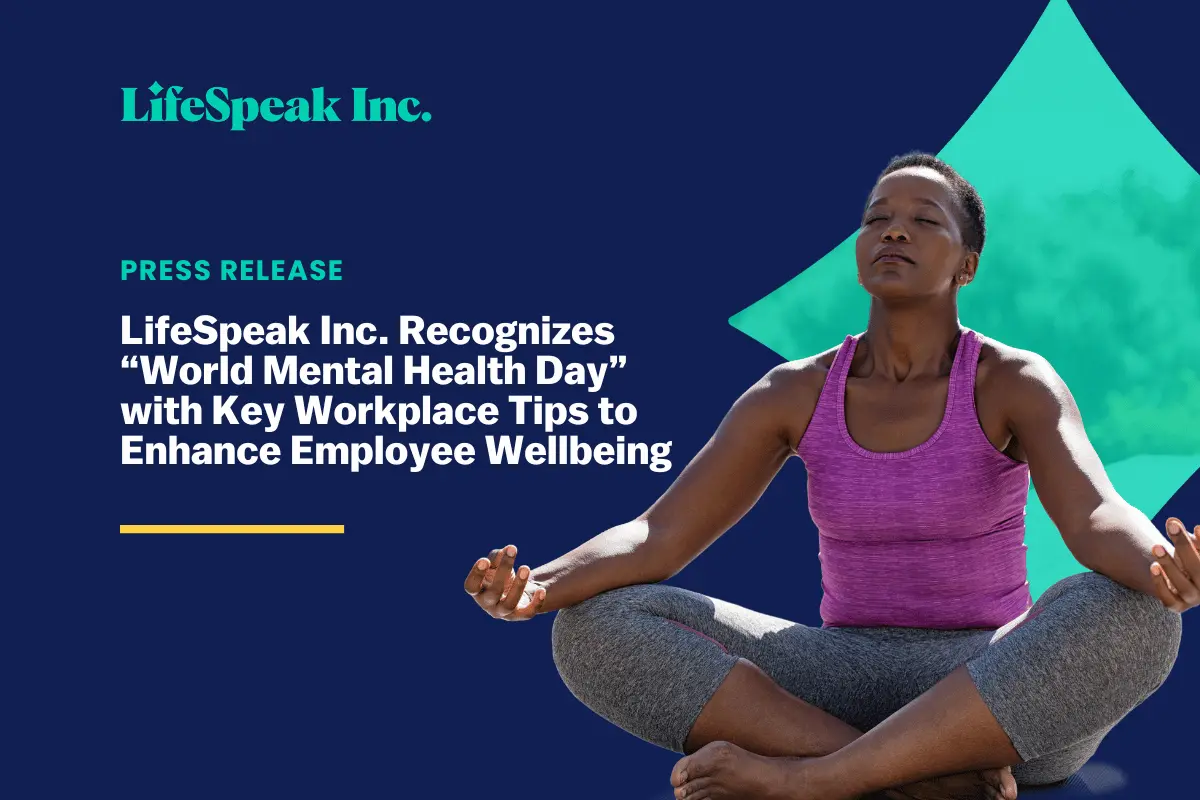Press Release: LifeSpeak Inc. Recognizes “World Mental Health Day” with Workplace Tips to Enhance Employee Wellbeing
Press Release: LifeSpeak Inc. Recognizes “World Mental Health Day” with Workplace Tips to Enhance Employee Wellbeing
With World Mental Health Day approaching on October 10, this year’s theme, “It’s Time to Prioritize Mental Health in the Workplace,” couldn’t be more timely. According to research, 83% of U.S. workers suffer from work-related stress, with 25% saying their job is the biggest stressor in their lives. In fact, about 1 million Americans miss work every day because of stress. Furthermore, 61% of workers 18 and older feel employers have the responsibility to help them maintain their mental health.
“Besides adversely affecting job satisfaction and productivity, stress takes a toll on our physical health, our thoughts and feelings, and our behavior. Left unmanaged, workplace stress can lead to burnout, anxiety, and depression and a myriad of conditions like high blood pressure, heart disease, stroke, obesity and diabetes,” said Michael Held, founder and CEO of LifeSpeak Inc.
To address this challenge and foster healthier workplaces, LifeSpeak Inc. (TSX: LSPK), the leading provider of mental, physical, and family wellbeing solutions for employers, health plans, and other organizations, is sharing tips that employers can use to help employees better manage mental health.
1. Normalize discussions about mental health. While mental health conditions are gaining greater awareness, nearly half of U.S. employees are still reluctant to discuss such topics at work. Experts suggest that prioritizing mental health in the workplace reduces the sense of isolation individuals can feel, and the stigma associated with seeking help. Organizations can foster a psychologically safe culture where employees feel comfortable discussing stress and mental health topics. At the same time, leaders connect personally with teams to learn how they are doing, and to help employees feel supported at work.
2. Educate employees and create an environment that supports wellbeing. Struggling with mental health can make it difficult for people to stick with healthy routines and cause them to skip exercise, overindulge in unhealthy foods, sleep less than needed, or form unsafe habits with substances. Employers can help by providing healthy foods at work, encouraging frequent breaks to stretch and move, minimizing or eliminating alcohol at work functions, and making resources available that educate employees and support behavior change related to mental health, fitness, nutrition, substance use, mindfulness, and caregiving. By offering whole-person wellbeing solutions through LifeSpeak Inc., employers enable employees to access a wide range of on-demand classes and expert resources that promote physical and mental health, helping to prevent crises before they arise.
3. Acknowledge and support caregivers. Caregiving takes many forms and, while it’s a responsibility most people welcome, the stresses of caregiving can impact workplace performance. New data from a Surgeon General’s advisory report shows that 48% of parents say their stress is completely overwhelming most days. The data also suggests that parents and caregivers are disproportionately affected by mental health conditions. LifeSpeak Inc.’s Torchlight Parenting & Caregiving solution supports these individuals and families with a comprehensive suite of resources, including educational materials, webinars, tools, connections to local and national support networks, and, where available, personalized concierge services.
LifeSpeak Inc. offers a comprehensive suite of wellbeing solutions that support the diverse needs of employees. These include LifeSpeak Mental Health & Resilience, Torchlight Parenting & Caregiving, Wellbeats Wellness, and ALAViDA Substance Use. The breadth of these solutions appeal to employees and families across a broad range of needs, ages, interests, and ability levels. The LifeSpeak Inc. suite of solutions currently features more than 6,700 tools, and resources from more than 550 leading wellbeing experts and coaches, doctors, psychotherapists, fitness experts, nutritionists, dieticians, and substance use specialists.
